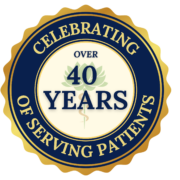An Origin Story: Why the Kaplan Center Was Ahead of Its Time
More than 40 years ago, the Kaplan Center for Integrative Medicine was founded with a simple but unconventional belief: when medicine gets complicated, care must become more thoughtful— not more fragmented.
not more fragmented.
At a time when most healthcare was organized strictly by specialty and symptom, our clinic was built around a different question: What is driving disease beneath the diagnosis? Rather than treating organs in isolation, we focused on the biological systems that connect them—and on patients whose conditions did not fit neatly into a single box.
This philosophy placed the Kaplan Center ahead of the times.
Seeing the Connections Before They Were Obvious
Long before terms like systems biology and precision medicine entered the mainstream, our clinical work centered on the shared mechanisms underlying chronic illness, neurodegeneration, and aging. We saw, again and again, that inflammation, immune dysregulation, metabolic dysfunction, and impaired repair processes were quietly shaping disease years before it was formally diagnosed.
Our early patients were often those with complex, persistent, or unexplained symptoms—individuals who had exhausted conventional options but still lacked answers. By looking across systems rather than within silos, we were able to detect patterns others missed and design more coherent, individualized care. It isn’t rare that a new study comes out and shares findings that we have been seeing within our patients for the past few decades.
From Complex Chronic Illness to Precision Care
Chronic and neuroinflammatory disease remains the cornerstone of our practice. We continue to care for patients with post-infectious and post-viral syndromes, autoimmune and immune-mediated conditions, refractory pain, and complex neurologic disorders.
What has evolved over time is not our philosophy, but our capability.
Advances in immune, inflammatory, and metabolic diagnostics now allow us to identify disease activity earlier and intervene with far greater precision. Our care has moved beyond managing symptoms toward stabilizing underlying biology and supporting long-term function.
Expanding Into Cognitive Health & Alzheimer’s Care
One of the most important evolutions of our original vision is the development of our cognitive health and Alzheimer’s care pathway.
Decades ago, cognitive decline was typically addressed only after symptoms became disruptive. Today, research confirms what our systems-based approach long suggested:
Alzheimer’s disease and related disorders develop over many years, shaped by inflammation, immune activation, vascular dysfunction, and metabolic stress.
Our cognitive health services reflect this understanding. We emphasize early identification of risk–up to 20 years before symptoms even occur– comprehensive evaluation beyond memory testing alone, and personalized strategies to help slow progression, preserve function, and support patients and families across the disease continuum.
Advanced Therapies, Integrated With Purpose
Being ahead of the curve has never meant chasing trends—it has meant adopting innovation when it meaningfully advances patient care.
The Kaplan Center is proud to be the first outpatient center in the region to offer therapeutic plasma exchange as part of a comprehensive treatment strategy for carefully selected patients with immune-mediated or inflammatory conditions. This advanced therapy represents a significant step forward in addressing complex disease mechanisms—and is never offered in isolation, but integrated into a broader diagnostic and clinical framework.
Beyond Illness: The Evolution Toward Healthspan & Longevity
While the clinic was founded to address complexity and chronic disease, our work today extends beyond treating illness alone.
Drawing on decades of experience caring for what happens when biology breaks down, we have expanded our healthspan and longevity services to help patients intervene earlier—before disease becomes entrenched. This approach focuses on precision prevention: identifying early dysfunction, reducing chronic inflammation, and preserving cognitive, metabolic, and immune resilience over time.
Longevity medicine at the Kaplan Center is not about chasing youth. It is about using evidence, advanced diagnostics, and clinical insight to reduce future disease burden and support healthier aging.
A Legacy Built for What Comes Next
What has remained constant for more than 40 years is our commitment to thoughtful evaluation, systems-based medicine, and long-term partnership with our patients.
The tools have evolved. The therapies have advanced. The scope of care has expanded.
But the founding principle remains the same: complex problems require deep expertise, careful listening, and medicine that sees the whole system—not just the diagnosis.
As we look ahead, that blend of heritage and innovation continues to shape how we care for patients today—and how we prepare for what comes next.
We are here for you, and we want to help.
Our goal is to return you to optimal health as soon as possible. To schedule an appointment please call: 703-532-4892 x2




